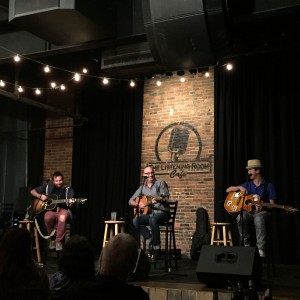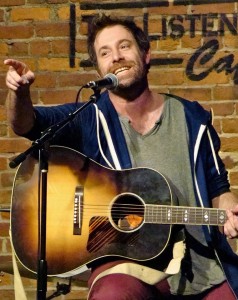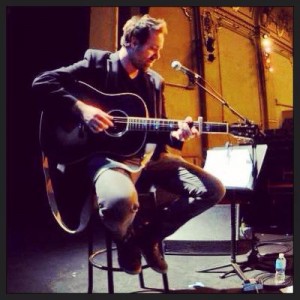Songwriting Session is a new weekly column that goes behind-the-scenes with artists and songwriters. Each Sunday, a new songwriter will share their journey and provide lessons they’ve learned along the way. This week, Phil Barton shares what he has learned as a songwriter.
Phil Barton is as animated as they come as far as performers go. A staple in Nashville’s songwriting community, he can be found playing writers rounds multiple nights a week and in co-writes three times a day. It’s this dedication to his craft that has made Phil as successful as he is, having many of his songs cut by artists like Sara Evans, Eli Young Band, Jana Kramer, David Nail, Eric Paslay and Mickey Guyton, not to mention a No. 1 for Lee Brice with “A Woman Like You.”
Phil got his start writing and performing children’s music in Australia while he was in college, which he explains was great training for his move to Nashville.
“The kids music thing gave me a grounding in writing catchy little songs and melodies that stuck with people,” he explains over coffee at Nashville’s Frothy Monkey. “Honestly, when you do a show for kids they get bored so quick that it was a real training ground for everything. The songs have to be great, the shows have to be amazing or people are going to get bored. That was a really good education for moving to Nashville.”

He soon signed a record deal with ABC Records in Australia and made a name for himself as a songwriter as some of his songs were performed on children’s television shows like Bob the Builder and Thomas the Tank Engine. He’d play close to 400 shows a year, many days driving to two towns in one day to play for as many as 30,000 people where kids would hang on his every word.
ABC Records also had a country label in addition to its children’s label and this is how Phil was introduced to the country genre, soon making friends with then up-and-comer Keith Urban.
“I got to meet everyone who was doing country music in Australia and became friends with them and started going to country music festivals and was loving the music. I met people like Keith Urban and watched him succeed,” he recalls with a smile. “I remember the times when we were getting emails from Keith Urban saying, ‘Oh, my song is 38 on the charts in America, this is so amazing. Keep believing in me!’ And then the next week it would go to 36. It was such a big deal for us Australians. When ‘But For the Grace of God’ went No. 1 it opened my eyes and it was like, ‘Oh man, I should go and check out this Nashville place.’ It seemed like this amazing world and you could do something amazing over in America.”
In 2005, four years after Keith’s single hit No. 1, Phil packed his bags to visit Nashville for the first time and immediately knew he had to move.
“It just felt like home flying in. It was the weirdest feeling ever,” he admits. “The first time I walked down Music Row I was shaking my head in disbelief. It wasn’t what I was expecting but it was even better. It’s just such a moment. I knew my whole life would change in that moment just walking down Music Row. I knew everything I wanted, everywhere I wanted to be.”
For the next few years Phil would spent three months in America and three months in Australia since he didn’t have a visa. While in Nashville, he’d make friends at writer’s rounds and open-mic nights and began co-writing in Music City. When he was in Australia, he’d continue writing children’s songs and music for Australian pop stars to save enough money to come back to Nashville. He likens it to having two separate lives. Eventually, he acquired a three year visa and thanks to the success of his No. 1 song in 2011 with “A Woman Like You,” he finally received his green card.
“A Woman Like You” was special for Phil because all the songwriters involved — Phil, Jon Stone and Johnny Bulford — as well as Lee Brice, shared their first No. 1 together.
“It was a big moment for everyone, really. It got us nominated for Song of the Year at the ACM Awards, ACA Awards, sold 1.5 million. Got us a lot of awards,” he says. “Me and Johnny won Breakthrough Songwriter of the Year on Music Row that year which is pretty prestigious when you look at who won that award, the Kimberly Perry’s and Chris Young’s, just some amazing writers. It was something special. It’s also great to have a No. 1 with your friends.”
So how does one even get a No. 1 song? Years of writing and embracing every opportunity. Phil says once he was living in Nashville full-time he took a writing boot camp held by acclaimed songwriter Jeffrey Steele. Steele’s advice to him: If he could write day in and day out he’ll have a hit.
“I worked my little butt off just trying to be a part of it; breaking into Nashville, trying to write with everyone. I write three times a day. I jump on every opportunity I can,” he explains. “When I first was here I would never say no. You never know when you’re going to meet the right person that’s the right co-writer for you, the right song. I would never have expected ‘A Woman Like You’ on that day but it happened and it changed my life. You just have to say yes to everything.”
Currently, Phil writes for Liz Rose Music and he said his publishing deal came after years of writing, friendships, studying the great songwriters and most importantly, producing good songs. But that’s not to say he hasn’t had his share of struggles.
“It’s hard,” he says of making a career as a songwriter. “You just want it to happen straight away and you start wondering why you can’t get these writes. People are going to cancel because they might not know you when you get to town. Don’t give up and don’t get discouraged by that. It’s a part of it. Know it will happen again and you might have to wait two or three months.”
He adds: “Try and write the best song you can write every day with all different kinds of people. You really never know. If you don’t enjoy a write, don’t rebook. It’s not like you have to say yes to everything.”
Phil further explains that being headstrong that he was going to have a hit in America kept him going during the more difficult moments. He says there was no way he’d go back to Australia without making something of himself.
“I was so focused on it. It was never not going to happen. It just had to happen so I’d do anything to make it happen. Along the way you have to be patient and know that the time will come and just be ready for when the time comes,” he adds. “I just had passion for Nashville and wanting to be a part of the community and writing hit songs with all these people who are writing hit songs. It’s kind of a drug. It’s definitely a drug once you have a No. 1. You just want more. You’re super focused on that. You know how great it feels to have success.”
Follow Phil on Twitter where he frequently posts about the shows he’s playing around Nashville.

